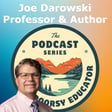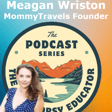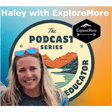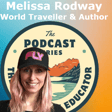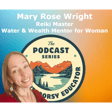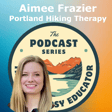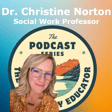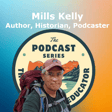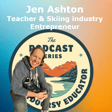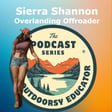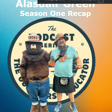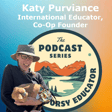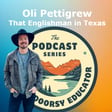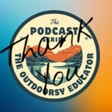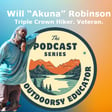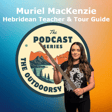Become a Creator today!Start creating today - Share your story with the world!
Start for free
00:00:00
00:00:01

Sean Critchfield
This week we are joined by survivalist, educator, actor and Queer Eye hero Sean Critchfield. We will discuss why the outdoors are important for all, being on TV and why the desert has more life than you might ever imagine!
Recommended
Transcript
Introduction and Apology
00:00:00
Speaker
Before we get started, I just wanted to issue a small apology. I was recording this episode away from home, so I had very little ac equipment but with me, and that may come across in some of the audio quality.
00:00:11
Speaker
But hopefully you'll find this interview and conversation as fascinating as it was for me.
Podcast Introduction and Guest Introduction
00:00:20
Speaker
Welcome to the Outdoorsy Educator podcast, the show where curiosity meets the open road. I'm your host Alistair and I invite you to join me as we explore the world through travel, adventure, nature and the power of learning. Each episode we dive into inspiring stories from adventurers, educators and global citizens.
00:00:43
Speaker
Whether it's in a classroom, on a local trail, or adventuring halfway across the world, there are stories to be told and lessons to share. So pack your curiosity, lace up your boots, and let's discover how the world can teach us all one step, one story, one adventure at a time.
00:01:03
Speaker
This week we welcome Sean Crutchfield. An actor, teacher and passionate survivalist who truly belongs in the wild. With a deep appreciation for dark time, Sean thrives when he's hands on with nature, honing skills that connect him to the land and the old ways of living.
00:01:22
Speaker
Whether he's on stage, in the classroom or building a fire with nothing but what the earth provides, Sean brings presence, grit and a deep respect for both craft and wilderness.
00:01:34
Speaker
Oh, and you may know him from a small television show called Queer Eye, where he was one of last season's heroes. Well, joining us this week is Sean Critchfield. Sean, how are you today?
00:01:46
Speaker
I'm fantastic. I'm super excited to be here. I'm super excited for this conversation.
Connection and Shared Interests
00:01:50
Speaker
um it was so funny to me, like, you know, in the virtual space of the interwebs that you and I connected and immediately hit it off. So I just feel like this has been a long time coming and I'm excited.
00:02:03
Speaker
Yeah, it really has. It's, so I mean, we've been talking, I guess, a year or two. We'll get into how we connected shortly. But yeah, I mean, it's it's great to finally sit down and have this conversation with you, as you said, a long time coming. But why don't you tell listeners just a little bit about who you are and a little bit about yourself?
Sean's Diverse Career
00:02:21
Speaker
Sure. I'm so i'm ah Obviously, I'm Sean. And and i am ah um i've been i don't i don't like to place titles upon my myself, but I've been called a polymath in the past, and I um i do a lot of things briefly.
00:02:41
Speaker
I think that also comes with being a performer. You know, we've had many, many jobs, but I've been a career performer. I performed in Las Vegas and all over the Strip for the last 20 plus years.
00:02:52
Speaker
um I am also a educator. I run my own teen theater. I've worked in the school district, um teaching in the arts and in emotional health spaces. um I am an outdoor enthusiast.
00:03:09
Speaker
um with quite a bit of training. I've got a lot of certifications. I've been referred to as an expert. I don't know that any of us will ever be good enough to truly be an expert, especially in that skill set, but um I'm pretty good at it and I've got a lot of dirt time and right also a photographer. um i am,
00:03:32
Speaker
um yeah, I've worn many, many hats, but I would say that the main three things that that I gravitate towards is I consider myself a an outdoorsman and a educator and a performer. And I'm also ah a dad and a husband.
00:03:51
Speaker
and um And I was on the last season of Queer Eye as well. Season nine, episode 10. Season nine, episode 10. That's where we We first connected after that because, so my wife and I, but now this could get confusing for listeners. Both of our wives are called Kate.
00:04:09
Speaker
So we'll try to be clear on that. um Yours is Kate with an accent, ah with the with the accent. Mine is um Kate with the English accent. There we go. We can do that. Yes. Well, my Kate and I sit and watch, we've always enjoyed Queer Eye, um as I told Sean before we came on the air today.
00:04:27
Speaker
It's just a show full of positivity. And I think we need as much of that as we can. um But then she and I were watching it and at your episode and she just kept saying, you guys could be brothers.
00:04:39
Speaker
You kind of look alike. You both have a similar beard. He's into the same stuff you're in. You guys should be friends. And then as again, we talked about before we came on the air, your Kate has the same instincts as mine when it comes to when they need to kick us out the house to go and get some dark time.
00:04:57
Speaker
yeah um And then we I connected with you on Instagram after that. And we've been having just a sort of ongoing conversations since then. And we'll get into the Queer Eye stuff because I'm fascinated to hear about what you you can tell us about that experience.
Influence of Family and Nature
00:05:12
Speaker
and How did you first get into the outdoors, the survivalist things, that the bits and pieces? um Because you did drop in in the Queer Eye episode. Oh, yeah, i spent 10 days in the Ozarks with a knife.
00:05:24
Speaker
And I remember that comment thinking, man, that guy's pretty cool, the way he dropped that in. Most people would go out for dinner on that kind of story. So you just you slid it in there. So I'd love to hear about your relationship with the outdoors and when it started.
00:05:38
Speaker
I love that. I love that. Yeah, absolutely. um So my dad um my dad passed away a little over two years now, um just before we filmed the um the Queer Eye episode.
00:05:54
Speaker
And my dad was um military, but also avid outdoorsman. And so when I was little, I grew up with dad in the woods. We always went camping.
00:06:06
Speaker
my dad was the first person to show me a deer print in the Sierra Nevadas, you know? And so dad was the one that first brought about that instinct. And one of my dad's proudest things about me was that I surpassed him in those skills. And he would regularly say that he would regularly say, I got him started, but he took it so much further than me.
00:06:28
Speaker
And I just, um, I had some of the similar things that I think for some of us that got me there, you know, reading um the hatchet series, reading my side of the mountain, you know all those things kind of ah triggered some of that in me. um But I think the big thing was,
00:06:47
Speaker
I always had a calling to it. I always knew that it grounded me. All of my hobbies outside of performance were wilderness centric. It was hiking, rock climbing, summit hiking, ah anything that got me outdoors, fly fishing were were my hobbies. And so I think it was a natural progression for me to start wanting to get into the self-reliance and survival skills.
Foraging and Symbiosis with Nature
00:07:11
Speaker
And then I went out to the Pine Barrens and I did the Tom Brown Tracker School. I did the very, i um only ever did the first course, the standard. and Um, and while we were there, they were offering different courses. And I thought for sure that fire was going to be the thing that I was going to the most into a tracking or shelter building or all the hard skills.
00:07:34
Speaker
And then this brilliant, brilliant forager and, um, and survivalist in general, um Carmen Cordino took me out into the woods with the group and was pointing out these plants around us.
00:07:49
Speaker
And it was, that's medicinal, that's utilitarian, that's edible, that's these two, that's both. We'd walk another 10 feet and she'd do it again. And I realized that we were standing in a supermarket and that I was unable to see it.
00:08:03
Speaker
And in that moment, I realized that um the world is trying to provide for us. And we've lost our connection to it to understand how. And that in truth, everything we need is there and it's there in abundance.
00:08:17
Speaker
But we have lost our connection to learn how to receive it. And i didn't know that um when I left there, I was going to wind up being a plant guy. and Right. My my wife um jokes that that's how I socialize. Do you like plants?
00:08:32
Speaker
And we were on like one of our third dates. We were driving out. in the middle of the desert going out to this like opera house where we've always been, let's get off the beaten path and go do something fun.
00:08:44
Speaker
And this really rare plant called daughter D O D D E R was up in the desert. And it's like this bright orange webbing that appears on top of the plants and it's gorgeous. And so I saw it and I got so excited and then pulled over and I got out and i'm like this is daughter. It's also called witch's hair.
00:09:00
Speaker
It's so cool. And I'm telling Kate about it. And she said in her head, she went, does this guy think he's impressing me? And then now she looks back and she's like, no, he just really, really likes plants. and He just loves the plants.
00:09:13
Speaker
Yeah. So that was what kind of got me into it was, this awareness that the that everything is there and it's there in abundance and it's trying to provide and that it's not about me against nature, it's about me in nature.
00:09:26
Speaker
It's about the symbiotic relationship. It's about the receiving and the giving. It's about the caretake the caretaking. And so that's what made me super passionate about it was I almost feel like we're missing an entire portion of our language as human beings without it.
00:09:42
Speaker
So... Yeah, that's it's so interesting. I was just talking to a friend of mine, um Zach, and and he was he's a homesteader in New Mexico. And he was talking about something very similar about it's worth absolutely tiny fraction of time we as human beings have been able to go to the grocery store.
00:09:59
Speaker
You know, that kind of thing. And yet we've lost this connection that we have had since the dawn of human existence. You know it's just been such a small percentage that we're not foraging and we're not going into the outdoors to look for food. So it's a very similar sentiment, which is ah really interesting to me.
00:10:16
Speaker
Now, were you born and raised in
Surviving Harsh Environments
00:10:19
Speaker
Vegas? This isn't a place I associate with an abundance of flora. you know In my head, of course, and I'm sure it's a naive opinion.
00:10:27
Speaker
um It's not. It's not? Okay. yeah um Yeah. No, I'm not born and raised. My dad was military, so I grew up all over the the place. We were um sorry were in the Far East and right You know, um stationed in Japan and we lived in a bunch of different places in the US and then finally retired when I was about 13. So most Las Vegans would consider me born and raised because I've been here long enough. I watched all the transformations. Right. um
00:10:59
Speaker
it's funny you bring that up because i really genuinely believe that part of the reason that i'm on the map at all as a survivalist that like people in the survival community actually know who i am is because i got really into the mojave desert and when we moved from mojave to sonoran all of a sudden the amount of plants and things expands We know we get coastal Mojave, like the Chimash and the Tongva, like that area is really lush.
00:11:25
Speaker
But where I'm at is no man's land. And so when I started asking survivalists, um who do I learn from? What do I read? How do I get started? Their answer was go someplace else.
00:11:36
Speaker
And I thought, no, Anasazi did it. The Paiute did it. The Shoshone Paiute did it. Like there are so many communities that made this their home. that we just have to drop in and figure it out.
00:11:50
Speaker
So yes, when i go when I go someplace else, I'm like the abundance is mind blowing to me. But that community is not um ecosystem is still... So sorry. um that ecosystem is still trying to provide.
00:12:09
Speaker
And it just took, you have to want to hear it more. And I think that because I've specialized in such a hard environment, that's what put me on the map. I think that if I were in any other community, I would just be some guy who did survival skills, you know Right, right. If you were in the Appalachians or something with all the lush green, blah, blah, blah.
00:12:29
Speaker
Yeah, you'd be, yeah, you're right. You would just be another guy. But you've taken a different path, and I love that um because, of course, there's so much vast, expansive desert that, again, i look at it as somebody who's grown up mostly and ah grew up in an urban environment and lives somewhere that's reasonably green.
00:12:49
Speaker
yeah i don't see the life. um you know I'm not looking through that lens. of and There is an abundance of life out there. might just be a bit harder to see. Yeah, yeah, yeah. Come on out. we'll We'll hit some dirt time. I'll show you around. I'll introduce you to my friends.
00:13:03
Speaker
Yeah, wait I'm good. I'm good. I love it. I'm going to take you up on it. I was thinking um I flew from Dallas up to Kansas this morning and I've got of the lower 48, I've got four states left.
00:13:16
Speaker
And it's quite telling that Nevada is one of them. Because when I first moved to the States, I thought, well, Nevada is eight desert. got nothing against the desert, but didn't jump out at me.
00:13:27
Speaker
And it's Vegas with all the flashing lights. And that doesn't really appeal to me either. So it's never been on my radar until my brother and sister-in-law moved there maybe maybe eight or nine years ago. They've now relocated again.
00:13:39
Speaker
And he's big into mountain biking. And every weekend he was sending pictures of just stunning views. And and it really, I was like, man again, showing some naivety, you know, and i like this is beautiful.
00:13:52
Speaker
So I will take you up on that. I'm going to, we'll make it my way out to Vegas and let's get some dark time out. Yeah, I love it. I love it. That would be fantastic. Yeah, man. You know, I mean, and double check me on this.
00:14:03
Speaker
I know that this that we are one of, but we may be the most mountainous state and in um on on the West Coast.
00:14:14
Speaker
I think we have more mountain ranges in Nevada than anywhere else, than Colorado, than anywhere. Wow. So, yeah. So the mountains, there's a ring of beautiful mountains around me at all times in the Vegas Valley. so And that's that's what the big thing was.
00:14:29
Speaker
The communities would move up to the mountains during the summertime and then back down to the floor during
Knife-Only Survival Challenge
00:14:35
Speaker
the wintertime. And so that was kind of their sacred hoop. and that's how you survive in this area is the the survivable locations rotate according to season yeah this is so interesting um just to up sticks and move up and down the mountain is absolutely fascinating um So, and then tell, I've got to ask more specifically about this Ozarks with a knife for 10 days.
00:14:59
Speaker
Yeah. But you know, how did that, come how did that situation come about? Cause that really caught my ear. I love that. You know, I'm really excited. Like obviously in Queer Eye there's only, they only have so much time and they shot easily, I'd say 70 hours of footage in the week that we shot.
00:15:17
Speaker
and And then they have to condense that down into one episode. So of course they have to like do a lot of picking and choosing. I'm glad they mentioned the survival stuff, um but it's such a big part of me that any opportunity that I get to talk about it, I will.
00:15:30
Speaker
And I also like also really appreciate you and the work that you're doing, because I think that unfortunately in this community, there can be a little bit of gatekeeping. And I'm like, no, this is our birthright, first of all.
00:15:41
Speaker
And second of all, it really is. um ah It's not dying anymore. It's actually gotten much more prevalent, which is exciting. But it used to be a waning skill, a skill set. And and i anyone that ever wants to learn from me, I'm down.
00:15:56
Speaker
I have um a website that's ruggedindividual.ist. So I know I'm very clever. That's very nicely done. Yeah. Yeah. So if you want to check that out, like you know um I'm open to teaching anyone, hit me up. But the reason that I bring all that up is because...
00:16:15
Speaker
um I went to a lot of schools and I did a lot of education. And the way that this came about was I was working with a program um called Sigma that's in Missouri, and it's considered to be one of the toughest survival schools in North America.
00:16:32
Speaker
And so you do a series of courses and then your culmination is you do what they call knife only. And so it's 10 days, just a knife. into the woods, you go, we'll see you in 10 days. And we're so on top of this mountain with our knives and they've got a camera and they're going around and they're having us do a video disclaimer.
00:16:51
Speaker
They're like, we are six or more hours from from higher definitive care. We are all trained to help you out. We're going to do our best, but just understand that you you are about to enter into a life or death situation.
00:17:04
Speaker
And so for the next 10 days, you had to provide food, water, shelter, fire with your knife. um If you could hit particular benchmarks and prove that it was sustainable, you could get pieces of gear back if you wanted, but you had to prove that you could do it without the piece of gear.
00:17:21
Speaker
um And then, ah but it was literally everything. You could tap if you needed to, and you were out of this scenario, but, um, We were supposed to be alone. You, of course, would run into each other periodically, but the objective was to experience this whole thing alone.
00:17:38
Speaker
Your instructors would definitely come in and check on you and your camp and make sure you're okay periodically. And then the other big catch was you had to eventually stop losing weight because if you do not become sustainable, you're slowly down.
00:17:52
Speaker
so they wanted to prove that you could achieve sustainable with just your knife. And I think my favorite part, which is um and sorry, guys, it's Sigma if I'm ruining part of the surprise.
00:18:04
Speaker
But one of the things that I thought was super brilliant was um when we were done, they said, we are not teaching you how to survive for 10 days with a knife. We're showing you how much it sucks to survive for 10 days with just the knife.
00:18:16
Speaker
So if you're going to leave your car for a five minute hike, take your pack with you. It doesn't matter if you're going, if you are sightseeing and you're going to walk down to the edge of the canyon and look over the side with your family, take your pack with you.
00:18:29
Speaker
It costs you nothing. It's a small go bag. And that stuck with me. That idea of my life is so much easier. Ten items is an abundance of riches when all you have is a knife, you know. And yeah, it was a crazy course. It was really fun, though.
00:18:46
Speaker
And it I sustained myself on gratitude. um I would get up first thing in the morning and I would i was by this beautiful river.
00:18:56
Speaker
It was the White River. and um And I would just spend time in naming out loud everything that I was grateful for that I had.
00:19:09
Speaker
um I found that really, really great stand of echinacea. um I found all that nettle. um I found that sassafras tree. I found those raspberries. My trot line produced. I have this beautiful view.
00:19:22
Speaker
I have my family. I have, and I would just sit in a space of gratitude so that I began my day in the right frame. And then um I just, I enjoyed it. I had a blast. It was hard.
00:19:36
Speaker
You carb crash. You're cold. You're cold you' wet until you get things built up. But those first couple of nights were heinous. you know but yeah So is it like when you prove that you can start a fight, let's say down to basic terms, you've done that once or twice. Would they give you then a ferro rod or something?
00:19:56
Speaker
Yes. That's kind of how works. Yeah. And you you could get those items. You could earn them back. You didn't have to take them, but you could earn them back. Yeah, suppose it's up to you if you've earned it to take it or do you want to authentically perhaps yeah see this through the 10 days. That's interesting.
00:20:14
Speaker
yeah Can you tell us what you chose? um i chose ah I chose ah the only thing that I chose to take back yeah when we were done.
00:20:25
Speaker
out of like I had all the options. And the only thing that I opted for was um the ah water purifier. And that's just because I'm i'm paranoid. I'm irritating the water out well. Like when we first got there,
00:20:40
Speaker
You know, I ah survivalists are going to freak out everywhere. i'm going to hear them scream out in unison. But like you get to the point where you don't have time to boil and you have to find a seat and you have to drink untreated water so that you don't get dehydrated. Like I needed that push to the next level.
00:20:57
Speaker
So i did that. And then I constantly had water on rotation. But my brain is always, am I going to get contamination from the lip of the bottle? Like there's so many ways that you can get it that people don't think about. So for me, um it was more about I know I can do this. I've proven I can do this.
00:21:13
Speaker
And I'm still going to boil water, but I'm also going to pass it through my filter just safety measure. um Yeah. extra yeah I mean, honestly, the rest of the stuff, I was really enjoying it.
00:21:24
Speaker
um And you can use anything you find because it's an authentic situation. And I found a pot. um You know, I found a handful of things in the woods and I would bring them back and clean them up and use them. So I wound up accruing a kit.
00:21:37
Speaker
But um yeah, I did it all just with the knife. Yeah, it sounds a bit like um just everything you're saying reminds me of I'm sure you've watched or heard of the the History Channel show Alone.
Survival Shows vs. Reality
00:21:48
Speaker
You know, since although of course they start with their 10 items, I believe. Yeah, interesting, interesting quick side note there is I got shopped for Alone. I got reached out by the producers for Alone to go on Alone and I had just met my wife.
00:22:04
Speaker
And i was sending in my videos and doing everything. And within, I'd say within a month, I knew i was head over. I i had never, i mean, I was in my forties at this point, had never even entertained the idea of marriage. It was not something I thought I wanted.
00:22:20
Speaker
and met Kate and quickly after knew that she there was the possibility that this was going to be my wife. And I just thought to myself, like, there is no amount of money or time that is worth me missing this opportunity. So I backed off of the application process because I didn't want to get it and then have to leave my wife for six months to a year, you know, or my girlfriend at the time.
00:22:45
Speaker
gar for that But you you knew what was coming in your heart. It sounds like. Yeah. I did. Yeah. So, do I mean, do you watch the show? Do you find it interesting? Or are as a survivalist, are you a bit too close to that world to possibly just enjoy it for what it is?
00:23:00
Speaker
um i I enjoy it. I think it's out of the survival shows. um I think it's one of the better ones. I think that some that a lot of them are sensationalized in that. Like I know some people that did like Naked and Afraid and they ask you, what are your really strong skill sets? And you say North American wilderness, primarily mountains. And they go, great, Louisiana swamp.
00:23:23
Speaker
You know, and because they want the struggle, they want the they want to see that edge of failure. If it bleeds, it leads, right? And so I think that with a Alone, um That one for me is the most authentic.
00:23:38
Speaker
Like obviously they sensationalize some things and they edit to build tension and suspense. Of course, they've got to sell a TV show. Yeah, yeah absolutely. But I genuinely believe that it's kind of become the Olympics of survival. You know, I would say in the first few seasons, I would stand a chance. And now when I look at some of these people, I'm like, no, I, I, I'm not as skilled as that person. yeah So I love it. I think out of the survival shows, it's one of the better ones.
00:24:02
Speaker
Yeah, I agree. Like, I enjoy you Naked and Afraid when it's like, for me, that's one of those shows. If it's on, um I'll watch it. My wife particularly enjoys one variant of it. I forget what it's called, but it's more of a competition rather than just surviving.
00:24:18
Speaker
um But yeah, oddly, a friend of mine has just recorded an episode where they had to try an episode a season. It's, ah again, a slight variance. I think they just they have to adjust.
00:24:29
Speaker
Not just anything, but they have to survive 14 And they were somewhere in the Far East. I forget where, but I'm excited to talk to her and find out a little bit more about that. That's super cool.
00:24:40
Speaker
Yeah, but alone alone for me is just um I enjoy it because I've got a basic skill set, but by no means an expert in anything. So like and I'm just blown away by what some of these people do.
00:24:53
Speaker
Oh, yeah. But I'm definitely that guy that catches myself sitting on the couch with a a thing of popcorn going, what are you doing? You shouldn't be doing that. Like I have any clue how they're feeling.
00:25:04
Speaker
Yeah. Yeah. And that's one thing I tell people is like, until you're there and until your sugar is completely crashed and you are flat knackered to the point where as you're walking up a hill, you know, the tunnel is closing in because you're so hot and so exhausted and so dehydrated, you don't realize the kind of simple mistakes you make.
00:25:23
Speaker
um I caught a fish on my second day and I had it on a stick stringer, like where you just do the the hook stick and I had it in your mouth and the gill. And I was cruising through the brush and I got back to my camp and I looked down and there was no more fish on my hook.
00:25:39
Speaker
yeah And I was just too exhausted and too tired to go about it the right way and lost my first source of protein that I caught while I was out there. So I totally hear that. But I do that too, where you're like, oh, what are you doing? You know, and it's like, right yeah, it's it's tough. It's tough.
00:25:57
Speaker
you know Yeah, it's funny you mentioned that because that's the one thing that makes me almost like hold my breath. is on alone when they catch a fish. I'm always convinced it's going to fly off the hook just as it gets to the shore.
00:26:09
Speaker
Because again, they you know that's how they do television. But like I'm always waiting for it just to flip flop back into the lake. ma'am Yeah, but it's an experience I can't believe to. I've done a variety of week-long hikes, just everything on my back.
00:26:25
Speaker
But I've not had to hunt for food in that regard. um So it's something that just blows me away and just impresses that the lights out of me. It really does. um But how you've got that background, but you've also got an extensive career in in the arts.
Translating Survival to Education
00:26:43
Speaker
And I'd love to hear that how those two in some ways must blend together. Lessons learned from one transition to the other. In my head, probably the outdoors transitioning to education, but probably it can go both ways.
00:26:56
Speaker
um I'd love to hear your experiences with that and what you the lessons you've taken from one world into another. Yeah, I would say education goes pretty easily.
00:27:06
Speaker
You know, I think um that's not that's not a difficult leap between the survival stuff and education. um I think that the we're constantly learning in the world. the The outdoors is constantly trying to teach us, you know, and I think that if we're open and aware and we're listening, the lessons are there, you know. Right.
00:27:25
Speaker
So I think that...
00:27:29
Speaker
One of the things that the world provides that I think we're lacking a little bit is curiosity. So this is something I learned from a friend of mine, Chris Morosky, who is that dude is a maniac. He lived for like six years um on Snake River in a teepee.
00:27:48
Speaker
um Just yeah like I love that but up in South Dakota. would South Dakota? South Dakota. and Yeah, I've been up there. Buckskin, the whole nine yards. like He did the thing for six years.
00:27:59
Speaker
And he also lived full primitive for a while in British Columbia as well, and then moved to LA and started teaching. So I can't even imagine the culture shock that took place when that happened. But um I spent a lot of time learning from Chris, who's fantastic. And this is something he taught me is, you know, when I'm out with the kids, they'll run up and they'll say, what is this plant?
00:28:21
Speaker
And if I say that's globe mallow, It's over. It's done. That's Globe Malo. They're on with their lives. But if I go, i don't know. I don't know what that plan is. What do you think that plan is?
00:28:33
Speaker
And then they get down and everyone starts looking. And then the other kids see us invested in this moment. And next thing I know, I've got this ring of kids. And I'm like, well, what what color are the flowers? What does it smell like?
00:28:44
Speaker
Touch the leaves. What would you name it and i get them invested and then finally i'll give them the name but it's this weird thing where naming the thing it loses its curiosity and just because you know the name of it doesn't mean you know anything about it at all and so i think that that's where those two um overlap and then in performance I think that um I've thought this for a while. I think that one of the reasons that we like extreme situations and extreme sports like rock climbing and river rafting and why that appeals to um a lot of us is because it forces you into this moment right now.
00:29:28
Speaker
If you're on a rock wall on a rope and you've got to grab that next hold, if your brain is anywhere but what you're doing in that moment, going from that next hold, it's not going to work. You're going to fall.
00:29:38
Speaker
And so you are fully invested in present in the now. And I think that in theater, you must be as well. You've got to be it's acting as an acting, it's reacting, it's listening and responding.
00:29:50
Speaker
So I'm in the moment with the other person and I'm trying to create the closest facsimile to truth in life that I can. And so I have to be here with you in that moment. And I think that um in the woods, it's the same way.
00:30:03
Speaker
you have to drop into where you're at and the whole man versus wild mentality. I completely disagree with it. ah You can't win that fight. You're going to lose every time.
00:30:15
Speaker
So that's where we talked about it earlier. you have to and enter into that symbiotic relationship of, you know, giving and receiving and listening and understanding the circumstances that you're in, listening to your body.
00:30:27
Speaker
So I think that the biggest overlap that I've learned that feed into each other is just be in this moment now. you know And I think that's why it appeals to people like us who are big hearted, big presence caretakers and give give give, give, give, and are constantly thinking about how I can help others.
00:30:47
Speaker
And you and I are never people that tend to bring that back and think about ourselves until we get out and we're sipping, you know, ah pine needle tea right by a campfire, you know?
00:31:01
Speaker
Yeah. And it's very interesting because I truly believe and I try to live my life with a bit of a philosophy of, Anything physically that that I obtain, um more importantly, knowledge and information, it's just passing through me.
00:31:15
Speaker
um And it's my responsibility. Somebody has passed it to me and I need to pass it on somebody else. And that's you know one of the big purposes of my life. But you're absolutely right.
00:31:26
Speaker
Unintentionally, when I'm hiking alone, that's when I've almost become the most emotional. You know, um it wouldn't surprise me if I broke down in tears, that hasn't happened. But you're suddenly aware that there's no noise and there's no distractions. and The only thing left is those those internal thoughts.
00:31:44
Speaker
yeah um And I find that just just a fascinating thing that we've become so removed from because from the moment we can wake up to the moment we go to sleep, there's either noise or at least the possibility of it through a chosen distraction.
00:31:59
Speaker
Mm hmm. Yeah. Yeah. and And we are so invested in it. You know, I remember reading somewhere that the flicker rate of a fire is similar to the flicker rate of a television, which is why we can just like sit and stare at a fire. There's something about it.
00:32:15
Speaker
So I even think about that where I'm like, people may not and may not realize that the reason that they're drawn to the TV is partially the story and the compulsion of the emotional roller coaster, but also it's hearkening back to something ancient within them.
00:32:29
Speaker
You know, and i i loveizing I love that idea. And so I think that you're right. We were just so inundated all the time and that people have forgotten how to be their own company.
00:32:42
Speaker
And that was one of the weird things was. Everyone else in the group, like we were together for 45 days. We lived in the Ozarks for 45 days. From day one, you if you sleep in a sleeping bag or a tent, you fail the entire course.
00:32:57
Speaker
So we're building shelters the entire time. um We're living off the land, we're learning these skills, and then your final exam was that 10 days. And I was constantly like, when can I get away from everyone and just go be by myself?
00:33:12
Speaker
And everyone else really wanted to gravitate to that community. And so i I am unafraid to spend that time alone. Like that 10 days cruised by, i didn't get, you know, I missed my wife. I got a little homesick, but I never got into the space where, you know, my wife and I joke on alone that the second you hear them go, I miss my kids.
00:33:31
Speaker
They're tapping in the next couple of days. It's over. It's done. Yes. And I don't have that component. I'm sure I would in a long enough timeline. But at first, I like my company. I like my solitude. I like my space alone. And I think that we're similar in that way.
00:33:46
Speaker
Yeah, absolutely. Like, I'm a sociable guy, as I can tell you are. You know good friends, this, that, and the other. But I'm very content being on my own. um Yeah, it it doesn't bother me and in a lot of ways I i prefer prefer it.
00:34:01
Speaker
um Again, just a little less noise dialed down. yeah No, I find that absolutely fascinating. What an experience that must have been. But we touched on Queer Eye a few times and I know being television, there'll be things you can talk about and
Impact of Queer Eye Experience
00:34:18
Speaker
things you can't. So of course, if I ask a question that you're not privy to answer, just let me know. But I'd love to hear how that came about.
00:34:26
Speaker
Yeah. So um ah first of all, like because I think it goes it moves into it nicely. One of the things that I'm really grateful to you for is that um I think that there's this space of of men who are masculine and and have skills that are considered to be like masculine skills. and I, I, I'm, you know, you, people can't see me doing quotation marks in the air right now. right Go with me on where I'm going, everyone. i promise but Um, you know what is considered to be masculine skills. And we are considered, you know we we enter in the space where most people would be like, that guy is like a dude. you know And yet we are both completely in a space of being okay with our emotions and being okay with holding space for those emotions and holding space for the emotions of others.
00:35:17
Speaker
and And I just, um I really applaud that. And I'm grateful. I appreciate the work that you're doing with kids and modeling that because I think that unfortunately, um probably pretty universally, but in particular, a lot of men have a hard time um being okay with that.
00:35:34
Speaker
And I think that the only way to change that is to model a different behavior, right? and Yeah, I couldn't agree more. and Thank you for those kind ones. Yes. Yeah. um So the that's I say that because I cried a lot in that episode.
00:35:48
Speaker
Right. Yeah. ah So the way it happened was um my wife found out about it and my wife um submitted me and said,
00:36:01
Speaker
they they reached out and they were like, we're interested in in having you send the in some tapes. And um the episode two, Nicole and I have become very, very good friends. Like Nicole comes over to my house all the time.
00:36:12
Speaker
If you have not watched her episode, get tissue. And like one of the most, kind genuine human beings ever nicole's hobby is she weaves old um like walmart bags into um she crocets them into mats for the unhoused like that's her heart that's what she does with her free right and so um nicole had a similar kind of backstory when we talked about this that every single time they would reach out to me and go film your kitchen i'd be like all right sure why not let's do it so they point the camera at me and i'd be like oh hi
00:36:45
Speaker
I didn't see you there. And I was just being a total goofball. And I didn't realize that I was probably securing my place on the show. I was doing it because I was like, look, they're never going to talk to me again after this video.
00:36:58
Speaker
Like every single time I do the point that they like show up at our house and they're like, we want to take you guys out to lunch and like, just have like one final interview. And my wife's like, they're going to tell you you're on the show. And I'm like, no, they're not. And she's like, why are they coming to the house to take you to lunch on? And I'm like, they said, it's just another interview. And so we go to lunch and they're like, we're going to, we're, you're on the show.
00:37:20
Speaker
And so that was kind of the journey. And I was just a total goofball, totally being myself, just being silly and having a good time with the videos, thinking every single time that this is the end of the journey for me. So what does it matter?
00:37:33
Speaker
yeah Right. Right. And I suppose that, as you kind of hinted, that played in your favor, I suppose, because you've shed yourself of any, it sounds like any nervousness you could have had.
00:37:45
Speaker
Yeah. I think they also went, this guy's silly. He'll make a TV. Right. Absolutely. Yeah. And then um it was, it was a beautiful experience.
00:37:56
Speaker
um I loved all genuinely, like, a you know, i people are often like, um do you like are do you have to say this or do you mean this? And ah if I couldn't say it, then I would just keep my mouth shut about it. you know But I genuinely enjoyed my experience with every single one of the Fab Five. They are all just delightful human beings.
00:38:19
Speaker
And what you see is what you get. they It was truly done documentary style. Now, of course, there's the editing magic of TV. Like we talked about before, you got to see a tiny percentage of 70 hours of footage.
00:38:31
Speaker
but I felt accurately represented. um I felt like my relationships with my friends and my family were accurately accurately represented and there was no editing to change like the meaning of what we said. Once the camera rolled, the camera rolled.
00:38:49
Speaker
At most, they would tell me like, hey, you said when we filmed yesterday. That doesn't mean anything to anyone. So like that that's really confusing for your audience. so like be mindful of that.
00:39:01
Speaker
So they helped me to tell my so the story better, but they never changed my story. If that makes sense. Oh, it does. Cause of course, I mean, I just imagined if I were in your shoes, yeah, I'd be thinking in a linear sort of sense of yesterday or on Monday, but of course you're absolutely right. That makes no sense. Cause it happened three minutes ago due to the power of editing.
00:39:22
Speaker
Yeah, absolutely. That's, that's so interesting. well I'm really glad to hear that. Um, Like I told you before, I've really always really enjoyed the show. Jonathan Van Ness, my wife loves him.
00:39:34
Speaker
We've been to see him do stand up. I got her cameo. ah you know He doing the cameo for her birthday one year, things like that. So she'll be thrilled to hear about what positive experience um this has led to. And then again, sort of afterwards, you know in the aftermath of it all, have people I'm not going to stop you in the street.
00:39:55
Speaker
But what's it been like afterwards when people watched the show and it was on air and that kind of thing? How did that feel and what happened? Sure. Yeah. I mean, it was, I think it was, I, you'll be surprised to hear that. I think I was spotted in the wild, like three times.
00:40:09
Speaker
Um, I, and that there was not a lot of people that came up to me or if they did, they didn't, for whatever reason, chose not to come up and talk to me about it. Um, but, um, I was actually okay with that being more on the private side.
00:40:24
Speaker
Um, you know, I mean, I still occasionally, have messages back and forth with the guys, but for the most part, like that's, that's reality. They've, they've moved on to what they're doing and, and I've moved into what I'm doing and, but we still keep in touch and you can absolutely tell your wife that JVN is, ah is delightful and hysterical and a riot and so much funny stuff. And would, when the cameras were off, ah JVN and I were chatting and JVN was,
00:40:56
Speaker
so kind to me and there is so much like silliness like at one point he was like sean i think i'm attracted to you when they were filming and we're like joking back and forth and there is so much of like that silliness that i wish had made it in but again they only have so many minutes to cut that all down to so um what i would say the biggest effect that it's had is even with my social media they were like your social media is going to explode.
00:41:20
Speaker
I don't know that I would say explode, but it got me started and it made me start considering, like you said before, if if I want to be part of the narrative, then I need to tell the story.
00:41:30
Speaker
And so... I'm going to start doing the content that I want to do. And at first I was like, okay, everyone says it's gotta have a hook and it's gotta be this and it's gotta be that. And I finally went, I don't care. I'm gonna live or die on this hill.
00:41:43
Speaker
And I'm going to say things that I need to hear into other people's lives and try to encourage people and love people. And people are either gonna respond to it or they're not. And i think that um people have. And so I'm grateful to them for nudging me and going,
00:42:01
Speaker
You can do this regardless of whether or not there's a huge explosion in your social media. But I think the thing that has come from it is... the brave souls like you that have that, that went, I'm going message this guy, you know, and, and i hope that what you received on the other side, when you got my message back was that this dude is just a real dude living his real dude life every day, who is grateful to hear from me and is genuine and is going to have a conversation with me.
00:42:35
Speaker
Because that's what I want in this world is connection. So when someone reaches out to me, I'm like, yeah, let's do this. Let's chat, you know. And so that's been really special is the messages from Germany that have come in that my husband and I watched your episode and you really, he lost his dad recently and you really helped him grieve, you know, like, man, game changer.
00:42:58
Speaker
That's it. Absolutely. Cut and print, you know. Isn't it funny? And it's it's all, i feel, it's very sort secular, and it comes back to what you're saying. As guys, you know, we're not used to expressing it. And this
Authenticity in Media
00:43:11
Speaker
isn't it funny how through a television set 4,000 miles away, there's you in Vegas, there's a guy in Germany, and he's suddenly making this connection, you know, going, that guy gets it.
00:43:22
Speaker
He's lived it, you know. it's it's It's very sad in one sense, of course, you know, coming out of tragedy, but also a beautiful thing. um that we can kind of drop those shackles in a sense because this person understands I don't have to explain to them why I feel like this.
00:43:40
Speaker
yeah um I think that's a beautiful thing to come out of tragedy um and something I hope. But you're you're exactly right. This is is kind of what I'm doing with this podcast a little bit, not to change gears too much.
00:43:51
Speaker
I'm just having having fun and I'm learning and I'm immersing myself in in so you know in the something that I love. And I'm not following an algorithm or a plan or this is how to get xe amount of listeners or followers. None of that.
00:44:06
Speaker
um I'm just putting myself out there because I'm enjoying it. And I think the world needs a bit more authenticity, whatever that looks like. um And just having a great time. And like you said, you know, if the narrative, um I need to tell my story as well. Hopefully I can connect with somebody through that just just as you and I have.
00:44:27
Speaker
um But I will certainly pass it on to my wife about JVN being everything we happen to know. i so I won't name any names here, but a former co-worker who has since retired was his Sunday school teacher in Illinois and knows his family still to this day. He would come over for for lunch a lot in, think I think it was fairly rural Illinois where he's from, I believe.
00:44:50
Speaker
um And she said the JVN you see on the television it is the same person that the seven-year-old JVN was. Just the light of the room when he walks in and positive and upbringing and that personality has been there his entire life.
00:45:07
Speaker
I love that. Which was just so wonderful to hear. It was just such a coincidence that, you know, she happened to write on a Facebook post when I posted something about the positivity of Queer Eye. And if you just need uplifted in your life, give it a watch. And she was like, oh, yeah, I know him.
00:45:25
Speaker
Which is just such a small world. Oh, that's brilliant. Yeah. I love that. I love that. I think um I love that you're just saying. i think that um you said authenticity. And I think that is at the crux of it all.
00:45:38
Speaker
You know, I think that you and I connected because you can you can smell BS. you know We know when someone's putting it on. And that was when I went in to this experience with Kure, I said to myself, I am going to be me.
00:45:52
Speaker
I'm going to lean into yes. I'm going to do everything they ask me to do because this is a once in a lifetime experience and I don't want to cheat myself out of it. So I'm going... I'm going to go hard in the paint on this and we're just going to lean into it and we're just going to do it and it's going to be awesome. And I think too, like that, that idea of being vulnerable, like, look, they knew that my dad had just passed. So they knew, like, if I was eating a sandwich and they were like, what does your dad think of that sandwich? i'm going to be like, in right. And so like, but I was okay with it.
00:46:29
Speaker
You know, I, I was okay with, with, being open about where I was emotionally in this moment and because they were doing this incredible thing for me and my relationship with my son, you know, that they featured that so heavily was so important to me because I think that, um, that needs to be modeled. So anyway, I'm getting in the weeds, but, um, I think, uh, one of the things that was interesting was the perception of me from what my friends would say is they would say, yeah, me and my friends were watching your episode and they were like, is he really that nice?
00:47:04
Speaker
And all of my friends would be like, yes. And then my other world, which is like, I, I taught, wilderness survival for a counterterrorism school.
Practical Survival Training
00:47:13
Speaker
And that was bizarre.
00:47:16
Speaker
And I had to take a lot of the classes so that I knew what I was doing. And we can get into that a little bit if you like, but, um, Yeah, I'd love to hear more. That sounds like a really interesting thing. I'd love to hear about it. Yeah, yeah, I love it. That was another that was like, would you say, just casual drop that in?
00:47:31
Speaker
Yes. And those guys would be like, you know, and ah of course this is hyperbole, but they would be like, is Sean really that nice? Yes, Andy can kill you. Yeah. laugh You know, but like that this perception of me outside of that, I think is so interesting.
00:47:48
Speaker
um I'll touch on that quickly, but I do i I want to ask you a couple of questions. So um but yeah, there is a school. I can't say the name of the school, but um it was a counterterrorism school that that was led by a lot of like former genuine special forces operators, police, SWAT, things like that.
00:48:05
Speaker
And um a lot of it was um the lower tier was more about teaching bodyguarding and security guarding for people post-military career to kind of give them career and longevity they had like a drone flying program that they would people could learn to be drone operators things like that and then up to legit like i'm gonna go overseas and bodyguard someone training so that's what the school was for and they taught it in the same way that counterterrorism schools were taught so you learn that same kind of curriculum
00:48:38
Speaker
And then they realized that like if one of these guys for whatever reason gets kidnapped and then dropped in the middle of the woods or dropped in the middle of the desert, they're going to die. And they, you know, at that point, you know, they're going to succumb to the elements. So they realized that there was a gap in the education and then they contacted me and they brought me in.
00:48:57
Speaker
So these guys would go through this insane training and then get dropped in level Canyon in like, you know, um, uah Utah junipers and scrub oaks, you know, like that kind of environment right and get dropped with me and they'd all just be shell shocked and I'd be like, well drink your tea. And they've all got their tea and they're like sniffing it. I'm like, no, that portion's over.
00:49:18
Speaker
We're in the kumbaya, sit around the fire learn which plants we can eat portion. And I loved that I got to then hold that space for them to decompress and come down from all of that and show them how grounding and healing this environment can be.
00:49:31
Speaker
and then also how the how do we get the hell out so that was what i did for them but in order to do that you had to understand the rest the rest of the training so i had to go through their training program in order to um hold the position of instructor with them right i absolutely well i think that's again just a world i don't know about and 99 of us wouldn't but absolutely fascinating um just to think about what that must be like Yeah, it was, it was nuts. It was nuts. It was like, um, one of the things on the higher end of training that I do respect is, um, we would do things like, um, uh, at one point we were doing a medical training with this guy who you can actually take his courses, grizzly medical.
00:50:16
Speaker
And, um, he does a lot of like first responder training and, um, first on scene training. So we were doing first on scene training with tourniquet placement and they had like, misted the room lightly with pepper spray and were blaring music and had people screaming at you and you had to run in and like check the person, get your tourniquet, get everything set, check and make sure and treat three or four immediate care wounds in this super chaotic environment.
00:50:45
Speaker
And I love that they added that additional element because as you know, the only perfect survival shelter is in a survival guide. Right. It's, it's never the textbook solution. You're never, if you're ever building, which is the point I was going to next, if you're ever have to make a Baudrill fire, it's because you were lost, scared, exhausted, sun is going down, you know, and that's, and if you haven't practiced it, that in that scenario, you're not going to get a call.
00:51:13
Speaker
Anyone can get a call in their garage with enough time. But when all the elements are stacked against you, what do you do? And so we would do things like they would have us do a bunch of PT before we started so that we, our hands were trembling and our heart rate was super, super high.
00:51:29
Speaker
And then we had to try to get a call there so that we were simulating a stress environment and seeing if we could still pull it off. And so i yeah, that was, that's kind of what that world looked like. That's just so interesting. Yeah. Yeah. Cause you're absolutely right. there's a lot of people who say, well, yeah, I can, managed to get a call going in my, in in the backyard.
00:51:49
Speaker
You know, I could do in the jungle. Yeah. well No, it's two completely different situations and scenarios. And yeah. yeah Yeah. Our final exam, our two final exams with Sigma for Baudrill was um no tool, completely forged kit.
00:52:06
Speaker
So we had to like find tools. We had to um literally make everything twine our cordage, get everything. and start if if we had nothing, can you get a fire? And so I passed that one. And then the other one was to do it with white oak and white oak is the hardest wood that you can still get to coal up.
00:52:23
Speaker
And that was like, so I had to avoid the sweat dripping off my nose onto my coal because I was just working so hard and you know, things like dunking a cedar set in water for 30 seconds.
00:52:35
Speaker
and then taking it out and running the bow drill because cedar will dry before culls up so you can actually get a cull out of a wet um hearth board if you use cedar yeah stuff like that yeah that's just so interesting absolutely um you said you might have a question for me did i guess that right yeah yeah i bring on because i've got a couple for you which will We'll wrap this up with those, but I'd love to, why not answer some of your questions? I love it. I love it. So um I would say too, that like, I, this is an absolute blast. I know that we are destined to be, you know, lifelong friends.
00:53:10
Speaker
Yes. And, and I don't know if you repeat episodes, but I'm, I, you know, i know that we could do. Three or four of these. So if you ever would like me to come back on, I would be delighted. i appreciate that. I will definitely ask.
00:53:23
Speaker
Okay. So I think too that um I would love to maybe we can talk about having you come out and I'd love to do a knife only with you. In in the Mojave, we would bring water, have to period.
00:53:35
Speaker
You know, and what we can do is I can go where I know there's some springs and we can have water in case we can't produce water. But other than that, there's no reason. The desert's actually pretty easy to do like a to like a weekend knife only.
00:53:49
Speaker
um So you can experience it. We can build a shelter from the ground up. We can do the thing I would love and we can film it. So that was that's my first. I would, I mean, I just feel humbled and honored. I'm in. I would absolutely love to do that. Yes. Yeah. That'd be a blast. Yes.
00:54:04
Speaker
All right. So, um and now we've said it on the air. So we're going to have to, we've committed. Yeah. um Yeah. i I want to, I was curious, how did you get started?
The Role of Education and Nature
00:54:15
Speaker
One in and the wilderness skills and two in education, because that's also been a big part of my wilderness journey as well as the education. And I think it's so important. So how did how did you get into it and then how did it become that? Does that make sense?
00:54:30
Speaker
It does. Yeah. So yeah education, my dad was a professor. And so education has always been around me a lot of sense. And even as a teenager, I wanted to become a teacher.
00:54:43
Speaker
My life went off the rails a little bit career wise, did something different. And I was about 26 or 27. And the sort of long story short is I walked into my local local college with a handful of ah credits of hours or whatever and said, what do I need to do?
00:55:00
Speaker
you know I know this is going to be a long journey. What do I need to do? And of course, that's been a while ago. It took me five or six years to get qualified. i just had a lot of things happen in my life, some good, some not so good, but I got there. and as Sometimes I was only able to go part-time for various reasons, but it was even though I've achieved more in a sense getting that degree and becoming a teacher today to this day is
00:55:31
Speaker
the most the thing I'm most proud of that I've done myself that doesn't impact, anything anything you know, that's not my wife or kids. Sure. um Because of what I went through to get there. And ah and ah I've only fallen more in love with public education the longer I be with it.
00:55:47
Speaker
My role has changed from teaching kindergarten, first grade, third grade, fourth grade to I became a behavioral coach because really, The way I always explain it is some people are gifted at teaching you know mathematics. Some people gifted with teaching drama or music, whatever it is.
00:56:06
Speaker
I was always able to connect with these kids. um you know The stereotypical angry child, the one who wouldn't listen, the one who was throwing the chair, the one who was this. you know, that I was, it's where my passion was as well, was I'm going to, I'm going to get this kid to to know that I'm a safe safe person to talk to and the school is a safe place to be and and figure out how to do that. And now I've transitioned into being a professor at local university. I'm starting that job shortly and I'm hoping to pass a lot of this on.
00:56:41
Speaker
um to our future educators because i always like to tell them and the and um I've stolen this quote and then got it wrong. So I can't remember what the exact quote is, but um you could be the most skilled brain sergeant in the planet.
00:56:56
Speaker
But if you don't have emotional regulation, I wouldn't want you coming anywhere near me. um That kind of attitude, if you know, that's the foundation of everything is able to control and understand our emotions and how to act in social situations, things like that.
00:57:11
Speaker
And I've always loved the outdoors. um Even as a child, i fought against it. I grew up in the city. So we um we would go out um in the summer, you know, go on what we call forest walks.
00:57:24
Speaker
And I remember not enjoying them, but then beginning to enjoy them. but I couldn't admit I was enjoying them because I'd already committed to the fact that this was not for me. um And when I moved to to America, really, you know I fell in love with just the vastness. I still got that love for this country in the sense of just the incredible difference from coast to coast, from desert to mountain to this to that.
00:57:49
Speaker
It's something that fills me with wonder. and And I think I'll carry that with me forever. And, um, Like many people, I think I was maybe 20, I read A Walk in the Woods by Bill Bryson and pumped my ears up at the Appalachian Trail and, oh, I want to get out there one day. But before that, did lots and lots of hiking. um It's always been important to me and my kids were little to get them outdoors.
00:58:14
Speaker
Lots of camping, lots of hiking. um And then... As I was a teacher, we started taking these kids from the city to science camp.
00:58:25
Speaker
And science camp has really stuck with me because we saw children who, they had an armor on, a defensiveness all the time. And they were, they were I said a lot of the times, quite angry just at the world. They didn't trust adults.
00:58:40
Speaker
I didn't blame them. you know When you learned what they'd gone through, they certainly didn't trust figures of authority and teachers. and I kind of got it, but when they were in nature, suddenly they were just seven-year-olds playing with sticks.
00:58:53
Speaker
And and it was all you could, I swear you could almost see them shedding this armor and they were actually allowed to be children. And the more I got to know them, they they would kind of open up and they would say, yeah, in our apartment complex, we have to defend our turf.
00:59:09
Speaker
You know, our mother physically fought the mother in the apartment downstairs at the store. We have to defend, you know, they have to be on. And they didn't know how to not have that that switch switched on until we took them to science camp.
00:59:22
Speaker
Yeah. And it really just hit me across the face that this connection is something that I didn't know if we'd lost it. i didn't know. But I just needed these children need it. Yeah.
00:59:33
Speaker
And I'm sort of, I've become very passionate about, even if it's just at the park, as you said, you know, look at the flower instead of naming it and moving on, let's dig into that a little bit. Isn't this incredible? Isn't this amazing?
00:59:46
Speaker
um And do I know where I'm going with this in one year, five years, 10 years? Not really, but I know that that's something I'm incredibly passionate about and I want to explore.
00:59:59
Speaker
Yeah. So that's how those two worlds have come together. I love that. I love that. Yeah, I think, um again, another interesting parallel. My wife is an epic badass. My wife is just, I just admire her so much. And she recently left her career to go back to school to get her third master's degree in performance. So she's a maniac. But when you were saying earlier, like, you know, made some interesting choices, like another parallel. Sounds like our wives have stuff in common too, which is lovely. Right.
01:00:28
Speaker
um And yeah, I love that. I think one of the things that I'm sure you've observed as well is when I watch kids play, I would point this out to their moms, that um it's that thing you were talking about, about there's a health and them just going back into the play in that space and that survival instincts come naturally to them.
01:00:47
Speaker
if you If you take 50 kids and set them loose, five are going to be building a shelter, right? A fort. Three you are going to be hunting a lizard. Two of them are going to be like making bracelets and you know in things with the flowers and um playing in the water, starting trying to start a fire.
01:01:08
Speaker
ah they You put them in that space and they immediately gravitate to those core skills and those core needs. And it's that same thing where I just watch everything drop away.
01:01:18
Speaker
And I watch them go back to that space of... I am a being in in this vast expanse of the world, you know, and I just like, and and I just love that so much. It's always been my healing place. so it makes sense to me. And the other thing I think that they, is they feel like they're getting away with stuff, you know, should be like, I can't get them to eat vegetables at home and you're getting them to eat plants off the ground.
01:01:44
Speaker
And I'm like, yeah, it's novel. They feel like they're getting away with something with me, you know. Right. It's just framed differently. You're absolutely right. um And you've just reminded me i literally reading last week, so it's I won't get this quite right, but I was reading about historical...
01:02:01
Speaker
ah education um in Greek society um a couple of thousand years ago. i promise I won't bore everyone with too long of a story, but it was all about how play was integrated into education.
01:02:12
Speaker
And literally when you get up on stage and act, that's why it's called a play. It's why you hit play on your DVD player. It's why you hit play you know on on anything to plays music, you know because that is play.
01:02:27
Speaker
yeah um And it's all integrated, running around in the park, being outside, acting, music. They all come from this this source. And it was very important ah very important philosophy in Greek education.
01:02:41
Speaker
And of course, I just never connected with the fact that you go and see play and what that word play means. yeah It's one of those things I find myself now as I'm driving, thinking about.
01:02:52
Speaker
I love that. I love that. Yeah, it was such an intro, and I can't wait to read more about it, to be honest, but it was such an interesting thing. It's so funny. and never I never explored it to that extent. One of the catchphrases we use a lot in theater is, like, when people start to get stressed, it's like, hey, everybody, we do plays, not works, you know? and like I love it. Yes. That's where it kind of, like, the root goes down to, which I just i just love. I think that's so fantastic.
01:03:17
Speaker
how did you and How did you and your wife meet? and We lived in the same community. um is what This is both of our second marriage and we lived in the community and our kids kind of met at the park of all things and then we've been married for just over 10 years.
01:03:35
Speaker
All right, so we have the park to thank for it. and We do, we do. We have the we have the outdoors to thank for it. That's a very, ah that has never occurred to me until this moment. ah what ah Before we wrap this up, I've got three questions i would like to ask you um How do you handle moments of self-doubt or uncertainty?
01:03:56
Speaker
um that is That is such a good question and it's something that I've been working on lately. is I try to view it as um I am driving a bus and there are all these different versions of me that sit on the bus.
01:04:09
Speaker
And if one of them comes up and is trying to grab the wheel and is trying to tell me that I'm wrong or bad or whatever, that I have to default to that person is looking to protect me. And maybe they're just not doing it in the most healthy way possible.
01:04:23
Speaker
And so i run a teen theater called Alchemy Arts Academy. um I'm one of the founders of the Dear Friend. And I asked myself, what if you were in class and one of and one of your students approached you with this kind of negative talk or self-doubt talk?
01:04:39
Speaker
What would you say to them?
Handling Self-Doubt and Reflection
01:04:41
Speaker
And I would say, hey, this isn't you. I'm not sure what's going on, but like can can we check in? I would immediately move to a space of care.
01:04:50
Speaker
I immediately move to it. So what I'm trying to do in my life and I fail at all the time is when those moments of self-doubt come up, try to figure out what's at the core of it, because I'm convinced that it is trying to protect me and it's trying to care for me.
01:05:08
Speaker
And so that's why it's self-doubt. You can't do this because, well, why? Because this or this or this could happen. Well, okay, but what if it does? Well, then you're going to feel like a failure. Well, I don't think that's going to happen and I can address it and move past it. So that's kind of what I've been doing lately is trying to reframe self-doubt as a protective mechanism that I can seek to understand.
01:05:29
Speaker
That's so interesting because I've some self-doubt with a career change recently as a' moving into this professorship. And I know it's protecting me from my imposter syndrome that I've struggled with most of my life.
01:05:41
Speaker
So that's very interesting that you bring that up. Well, I can tell you that I'm at UNLV. I'm an adjunct professor there and I teach performance studies. And you are going to excel.
01:05:53
Speaker
You're going to be fantastic. you you One of the things that I love about that higher education model is that they they when I am most successful is when I'm bringing my authentic self to the material.
01:06:03
Speaker
It's less about the material and what you're doing with it. So like you can't you can't fail at it because if you just go in and you are you, it's it's going to work. you know so Yeah, I'm excited to get stuck into it. It'll be a great challenge, but very rewarding.
01:06:20
Speaker
Love it. If you could go back in time and witness any historical event, what do you think it would be and why? Oh, wow. What a great question. um If I could go back and witness any historical event...
01:06:36
Speaker
um does can i go back to just Can I go back in time to a moment or are we talking specifically a historical event? It could be anything, anything at all.
01:06:47
Speaker
Something that has happened. Okay. Your choice. Okay. Okay. So I'm going to cheat a little bit and say philosophically I have so many things like, you know, can we go back and we, can we like jump in front of a bullet for someone? Or can we like, you know, they like my brain is like, Oh, there's so many abilities.
01:07:06
Speaker
And, and I think that, um, that I would love to go back and I would love to see what the world looked like. um before um industry, right? and And to see like, I would love to see that and see the plants and see the sky and see untamed wild.
01:07:27
Speaker
So I think that that's what I would do from a wilderness perspective. And from just going back to like witness an event, I would just love to go back to 13 year old me and go, it's gonna be okay.
01:07:40
Speaker
You get so much cooler. and her name is Kate. There you go. I love it. I love that. My final question for you is going to be, what book, movie, piece of art, or piece of music do you feel has had the most impact on your life and why?
01:08:02
Speaker
um i that is so that is That is such a great question. These are wonderful. I love it. My brain goes in a million different directions each time. um I'm trying to think if there is a quintessential like piece of artistic expression that I feel like um was it for me. um
01:08:26
Speaker
um
01:08:30
Speaker
Again, i'm I'm cheating a little bit, but it's what comes to mind, right? Is um there was there was a moment when my health had really, really deteriorated. I was i was in my early, early, early 20s.
01:08:43
Speaker
and right And I was um sitting on a beach in Thailand, of all places, um against doctor's orders. They told me not to go. And I was like, I'm going to travel anyway, because that's what we do.
01:08:56
Speaker
ryan um And the song Sleepwalk, um was playing at a cafe that was up on a beach and I was looking at the ocean and and I realized that if things were to continue on the trajectory they were and that my time in this human experience was going to come to an end, the thing that moves me the most is that um I would miss it so much.
01:09:23
Speaker
And I think that the reason that that that's what that song evokes in me every time is it takes me back to that moment on that beach where i realized that for all of its flaws, for all of its problems, for all of its pain, for all of its anguish, for all of its exquisite joy, for all of its ecstasy, for for the scope of the experience that we feel, including the bad stuff, I would miss it so much.
01:09:49
Speaker
And I try to remember that. um We're talking earlier about being vulnerable. I'm definitely in my emotions now. try to remember that in the course of my life, that even when it's really bad, it's beautiful and exquisite.
01:10:03
Speaker
and And it doesn't mean that we should indulge bad situations or things like that, but we can always remember that um it's part it's part of the journey.
01:10:17
Speaker
I love it. What a beautiful way to kind of wrap up this interview with that message. Now, if people would like to connect with you, find you, what what's the best way for people to get in touch? Um, I would say, um, I'm most active social media wise on Facebook, Instagram, or Tik TOK. If you search my name, it'll come up.
01:10:37
Speaker
Um, uh, Sean Critchfield and yeah, on any of those platforms. Um, and then you can also, I'd say that, um, Simplest way, if anyone's really interested in all things Sean, is my website is seancritchfield.com.
01:10:52
Speaker
And it's got links to like my photography and my wilderness stuff and my social media and my acting stuff. So you can kind of get one stop shop there. Beautiful. and We'll make sure when we this episode launches, we'll put links out there for everybody so so they can reach out. But Sean, I cannot thank you enough. This has been an absolute pleasure. Thank you so much for spending the last hour and 10 minutes with me.
01:11:14
Speaker
I love it. Thank you so much for having me. And I look forward to sitting around a campfire with you with nothing but a knife. I can't wait either. Thank you so much.
01:11:26
Speaker
Thank you again to this week's guest and I hope today's episode was as enjoyable for you as it was for me and perhaps even inspired your next adventure. If you did enjoy the show, please be sure to subscribe, leave a review or follow us wherever you get your podcasts.
01:11:43
Speaker
You can find more information at theoutdoorsyeducator.com or follow us on Instagram, TikTok or Facebook. Until next time, thank you so much for listening to The Outdoorsy Educator Podcast.
01:12:04
Speaker
um
